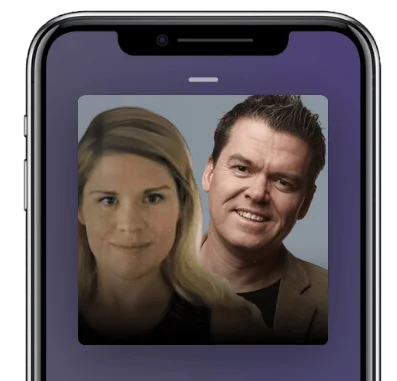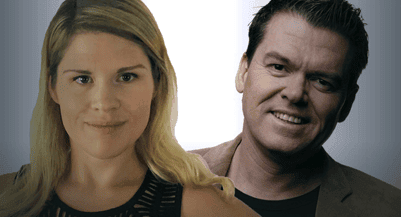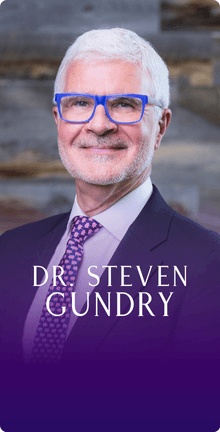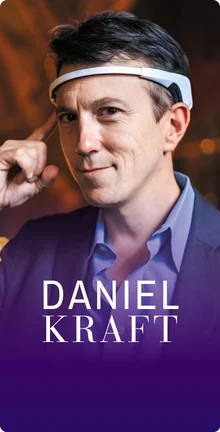In this Episode
- [2:14]Andy defines the term “transhumanism”.
- [5:21]What we can do today to expand our lifespan?
- [9:48]Technologies that are changing the way we can treat and prevent illness and disease.
- [11:10]How video games are becoming a game-changer in aiding brain science.
- [16:24]As the resolution of imaging increases, so does the potential for exploring and isolating problems in once impossible-to-access places in the body.
- [19:45]Nanites in the brain?
- [22:08]Pre-birth gene modification and designer babies, post-birth gene editing.
- [28:00]A look at the not-so-distant future of artificial organs and limbs.
- [34:40]An ethical discussion about what can and what should be done in the lab.
- [38:40]Andy gives us a couple of scientists to keep an eye on.
- [41:45]A couple of fascinating stories about body modification.
- [46:05]Technology already enhances our lives, but where exactly is cyborg technology headed?
- [49:39]Parting thoughts from Andy and Kay.
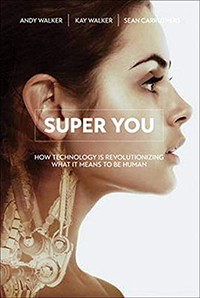
Welcome, Andy and Kay! It’s great to have you on the show!
Thanks, Stephan! It’s good to be here!
Yes, happy to be here!
Let’s dive into just to what is this idea of transhumanism? This might be a term that’s not really used in general conversation so our listeners may need a little bit of introduction to that.
Yeah, sure. Transhumanism is a bit of a, as you said, geeky term, but really, what it would reference is, is the transformation of human being into part-machine or a technologically-enhanced human. The whole idea as we move forward is, we become more entrenched with technology to improve ourselves. If you want to really good example of whether your transhumanist or not is, if you picked up your iPhone this morning and connected to somebody not in your backyard and had a communication with him, then you are being a transhumanist because you are using technology to enhance your life in a way that is way beyond what you could do when you were born. But, really, from the long view of it, transhumanism is the idea that we are eventually going to be as much machine perhaps as human being, and we are going to transcend, we hope, death, disease, and any kind of human suffering.
Right, so this idea of extreme life extension, what’s realistic? Because I have heard that for every year that you continue to live, that adds an extra year to your lifespan because of the advancing technology in medical science so just keep living long enough so that you can live forever, basically. I mean, is this really where we’re heading, or is it just maybe a 200-year lifespan? What can we honestly expect here?
Honestly, what we can expect is to live forever, and that sounds maybe a little bit nutty and crazy, but technology fills that gaps. It is what allows us to expand ourselves, and as we continue to fill the gaps over time, we will eventually end up being able to cure ourselves indefinitely.

The thing is this science and technology advances, we are finding ways to, for example, replace organs to repair cells, to modify our genes, and to evade genetic-based diseases and things that would kill us. If you look at the timeline of human being from the beginning of time through to now, the average life expectancy is expanding every year incrementally so for every year that you’re living now, you will gain a chunk of your life so by the time you get to your typical mortality, which would be in the US 79 or 80 years old, science and technology will be able to add lifespan to you. The theory is that in the next 13 years, technology and science will accelerate at a level where it will give us back a year for every year that we live. Meaning that, immortality is possible so, absolutely, the technology is going to be there in the next two decades,-we’re pretty sure. Your big job right now from a longevity perspective is to live 13 years. Don’t get taken out by anything else. If you can do that, then you’re on your road to immortality-if you choose.
What are some of the things that you can do today to extend your lifespan? Because there are so many tips, tricks, and obvious things like “Stay away from sugar” and “Don’t eat too much and exercise,” and that sort of stuff so, what are the things that are surprising in your research for this book that made you go, “Wow, that’s something that we can use today to really extend our lifespan!”?
Well, both Kay and I decided that we were going to take on a lot of the things we discovered in this book so we aggregated some of the longevity advice into our own lives and sort of looked at all the experts and said, “Well, what are the top 10 things that you can do?” You’re right. The standardized things like exercise, being active, getting married-that’s going to be a big one for men. Men live longer when they’re married. Women don’t gain anything by marriage, but they certainly don’t lose anything either. Have a drink every night, preferably wine and that sort of thing, but a little alcohol doesn’t hurt. Now, moving on to some of the more unusual things, we had a great chat with a guy called David Sinclair who is a doctor out of Harvard University, he discovered a compound called resveratrol. Resveratrol is a supplement extracted out of nuts, grape skin, and things like that so if you eat peanut butter, the sugarless kind, and you eat a lot of grapes, you’re already consuming resveratrol. The problem is, to consume it at a level that gives you life extension would require you to drink something like what was it? 80 cases of wine a day, which, of course, is not practical. However, you can get supplements that will give you massive doses of the stuff. What it does is, basically, it helps the cells in your system cleanse themselves so you have kind of garbage collectors in the cells and over time, the cells become less efficient, they don’t clean the garbage, and eventually, you’ll end up with cancer. This is one of the compounds that has been discovered that actually helps prevent cell death so that’s one thing.
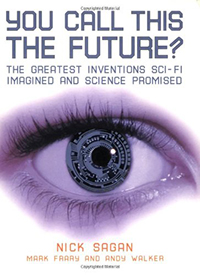
Another thing that might be kind of interesting is, Super Agers tend to have physical activity that’s incorporated into their lifestyle. They don’t go and have a crazy workout like a CrossFit workout. Actually, they’ll be moving gradually throughout their day doing, maybe, a lot of physical labor, and it’s that natural kind of movement that is said to keep you much healthier than sitting around at a computer most of your day, and then going and hitting yourself at the gym. That’s one interesting thing that a lot of people might do the contrary-might do the CrossFit workout.
Yeah, the marathon runners don’t live long lives as it turns out, right? Being a crazy workout fiend, according to the longevity experts anyways, is not your route to immortality. If you’re into chemicals and you want to do the pharmaceutical route, we talked to a guy who sort of wrote about his work. A guy called Nir Barzilai who is a doctor out of Albert Einstein College of Medicine in New York City. I reached out to him because he had some research that showed that people who are type II diabetes sufferers and have been taking a very, very cheap drug called Metformin were living longer. There was a study done that looked at their consumption of this compound, and it was showing some amazing longevity gains like one-third of the people who are taking this drug, I think it was, were experiencing long, long lives that are over and above the typical cohort so, he’s advocating and trying to get the FDA to convert this drug from just a prescription for type II diabetes into a supplement-basically, a longevity supplement. Now, what I did was, I went to my doctor and I took the research with me. I said, “Listen, I want this drug. Can I have it? I want to take it as a supplement,” and so my doctor, who was somewhat familiar with the idea, prescribed it to me. Now, it turns out that our local supermarket gives a stuff away with a prescription so I’m getting a free longevity drug that I take on a daily basis, which is sort of the cutting edge. It’s called Metformin, and I have an FAQ available on our website to read if you’re interested in doing some along those lines. I tell my story and how to do it so there you go.
And how long have you’ve been taking that for?
Well, I guess it was around-was it last fall? Coming up to a year now, I guess. Yeah, I think I went to see her actually in December or January of this year so what are we? We’re in in August now so, yeah, about six months-just over six months, I guess. I started thinking about it last fall. I wasn’t sure whether I was going to do it. What I found is that, inflammation soreness in my stomach-I tend to have digestive problems-seem to have been greatly diminished, and you do have to manage some of the side effects of Metformin, and be careful that you take it in with food and that sort of thing, but it’s not difficult to overcome. I found that, overall, my health has improved.
Hmm. Interesting.
Yeah.
What sort of technology, not like pharmaceuticals, but things that are-say, scanning devices, you wrote about ultrasound technology, for example-what are some things that would technologies our listeners should know about?
Well, there’s a whole idea moving in the next two to three years-a lot of these tests that you take now, for example, are sort of labs on a chip, and when they’re not quite available yet, they are going to be soon. Once upon a time, for example, to do some sort of drug test or some sort of insulin test or something like that, you would need, obviously, a big lab, and these technologies are becoming miniaturized, and I think we’re going to see a test-type things that will be available at your local drug store. There is one gentleman we talked to out of Europe who this kind of idea-he calls it a chip, but it’s actually not really a chip, it’s some of an organic thing that you slip under the skin into a main vein or main artery and it expels hormone when you are hungry, right? The idea is that, it helps regulate your cravings and your food control so it could be the future of dieting, for example. It’s in his lab now. He’s showing great promise on it. He figured, when we talked to him-do you remember how long it was, Kay?
He said about five years.
About five years until this thing is going to come widely available. The diet won’t be “Buy a book, eat more greens, less or no more fat or whatever,” it will be, “Go get a chip, insert under your skin into your bloodstream, which will help regulate the things that make you angry and that sort of thing.” A lot of those technologies are coming on stream in a big way in the next 5-10 years.
Videogames are becoming a really big technology in health care.
Mm-hmm. Also, video games-this might surprise you-but videogames are becoming a really big technology in health care, also in mental health, and expanding your intelligence or your brain’s ability so using video games to retrain you or train you to develop new skills-that is one really exciting technology that is right now in development, already in use, and in the next 5-10 years, is just going to explode.
The guy’s name is Dr. Adam Gazzaley, and he basically developed these games-really simple like Pong-type games or driving-type games that adjust to your feedback and helps your brain expand its capacity to remember things. He’s using them to heal some mental disorders as well. What he was going to start to do as we talked to him-what was it? Last year? I guess it was. We talked to him last summer, and he was going to start to enhance his own mental capacity, his ability, and his own intelligence, basically, so that’s on the real cutting edge of mental health. Who knew that, perhaps, Space Invaders would one day help us be smarter? But that’s the kind of idea.
Mm-hmm, right. There are already brain games out there that are widely-available like Lumosity–
Yeah.
How well do those work in comparison to something like what you’re talking about that’s not quite online yet?
I think with Lumosity, they’ve done it really well, and they certainly are cutting in to the very beginnings of this. Our sense from Gazzaley is that, he actually mentioned them and he said, “Listen, there is something to this, and those things are there because they do work,” but he said the work that he’s been doing really takes it to the next level. Because they’ve been doing things like, they’ve been testing feedback, they have all kinds of the ability to read some of the behaviors and that sort of thing, and some of the advances, and he’s demonstrated in the lab that these actually work.
Yeah, the real difference with his games are that they actually challenge the player back, and they challenge the player to a specific level so they don’t challenge the player too much because challenging the player too much actually has the player disengaged from playing the actual game. So, it challenges them just enough to expand their skills and to be a challenge enough to have them keep playing.
Yeah. I think it was depression-do you remember which kind of mental disorder he was-?
Alzheimer’s.
It was Alzheimer’s, yeah.
And depression, yeah.
And depression as well. Some really exciting things in the neuroscience world, and the video from video games curing things that we really have a real challenge with. In fact, we discovered that the irony is that, brain science is one of the areas that has really been lagging in development. We were still very much in the infancy of what we know about the brain and how we-
It wasn’t until the 20th century that we learned that the brain was plastic.
Yeah. Meaning what?
Brain science is one of the areas that has really been lagging in development.
Which was a game-changer because we realize that, “Hey, our brain wasn’t fixed by the time we became an adult!” We could actually change our neural pathways, which meant that we could reverse and retrain ourselves. We could lose a skill and retrain ourselves, or become really great at something, and then you know-
Lose it.
Lose it, yeah. There’s just so much work that still needs to be done, but what’s fascinating is now that we know with this, there are so many incredible technologies like this video game that we can use.
Yeah. To improve that. I mean, the other thing is, in our work on the neuroscience chapter, we were really interested, obviously, in artificial intelligence because, of course, once we understand the brain, technically, we can engineer the brain, but one of the great unanswered questions about the human brain is consciousness like, what brings consciousness? There is no really good answer. There are two counts. One is, we’ll never be able to artificially synthesize consciousness, and the flip side is, we’ll be there soon. It’s just a matter of engineering the right number of connections regardless of whether they’re alive or not. Once you synthesize enough connections, consciousness will naturally arise. Now, we’re not there yet so we don’t know, but it does look like that research is going to, obviously, accelerate drastically in the next ten years, and then the question is, when we do get to out 30 years or so to what they’re going to call the “technology singularity,” machines will have billions of times of the intelligence of a human being, and the question is, will suddenly become conscious? Because that’s kind of a game-changer. What we discovered was, in that chapter, there are a lot more questions than there are answers right now, but certainly, there’s been a lot of exciting things happening in the last 30 years or so.
Right. First, other current technologies, any kind of scanners? I mentioned ultrasound-that was something that you, guys, covered in the book-ultrasound, anything interesting. What’s it called?
The tricorder.
The tricorder, yeah. Anything like that’s online or coming online soon?
There’s a lot of handheld devices. I mean, the tricorder itself-the idea of scanning the body and actually getting a reading is still a bit science fiction at this point so, that said, what we keep discovering was all-oh, we can’t write about that because that’s not happening, and the next thing we knew, somebody popped up out of a lab somewhere and suddenly debunked that so we’re not going to say there’s no such thing as a tricorder because the probably is, and we just haven’t heard about it yet, but that said, from a scanning perspective, from a body health perspective, let’s talk about briefly about this sort of 4D ultrasound right now. When we started this journey with the book, Kay was pregnant and we have now a two-and-a-half-year-old son, and one of the technology we used was a 3D ultrasound, where they take slices of the imaging data and they compound it into a 3D image so you can actually see your baby in a still, and then the fourth dimension is time so meaning, a moving video of your fetus in utero, which is incredible. Now, what’s happening about a lot of these imaging technologies is that, resolutions are increasing so, once upon a time, if you ever looked at anybody who’s in their 40’s or 50’s and you look at their ultrasound when they were babies from the ’60s and 70’s, basically, there are eight pixels sort of all being scrambled and now, of course, you look at an ultrasound today, and it’s very, very fine. Now, what’s happening is that, the resolution every 18 months or so is seemingly a doubling, which means that you get out 10 years now, and you pretty much be able to see your baby’s face in utero. You’re able to see organs, other soft tissues, and that sort of thing. X-ray is one of those things that’s becoming-it’s still used for bone breakages and things like that, but CT scans and all those new technologies that are giving doctors new abilities to see and model internal organs and controlling internal structures and that sort of thing.
One of the great unanswered questions about the human brain is consciousness.
Well, the other fascinating thing that ultrasound is being used for is called “high intensity-focused ultrasound” and what that is, is using ultrasound waves to actually do surgery-non-invasive surgery-so instead of cutting someone open and working on them, you could actually just use ultrasound waves to burn tissue.
Mm-hmm. Yes.
Which is incredible. They use a primitive version of that focus ultrasound to blow up kidney stones. That’s what they use today, but the idea is now that you can basically cross the beam in multiple ways so that you have high-intensity energy that breaks apart. There was one technology that we talked about in the book where a baby’s-I think it was their larynx or something, and there was a problem with that, and they, basically, allowed to use that technology in utero so when the baby was still in the mother’s stomach to actually modify and burn away the problem so the baby was born without a problem, which is incredible. The other thing that ultrasounds being used for now is, nanoengineering. Because the wavelength of sound is such that it can be super fine-tuned, and one of the theories behind that is that you could move molecules around so if you could super focus the beam, you can actually use it as a tractor beam almost for molecules and other elements in a non-invasive kind of way. You can imagine moving elements together to manufacture something at a super tiny level. That, again, suggests that, if we’re going to be building nanobots floating around in our bloodstream or whatever, that’s one of the manufacturing processes that might actually be used at that point.
Hmm. Well, let’s talk about nanobots. Those don’t really exist yet, but that’s something that we’re going to start seeing in our lifetimes. Things like respirocytes, which transfer oxygen much more efficiently than red blood cells in our bloodstreams like a hundred times more efficiently so you could be underwater and not take a breath for 45 minutes. It sounds like a crazy science fiction stuff, but that’s what’s being worked on, for example.
Yeah.
What are some of the nanobots that, I think, you found most interesting or intriguing?
The one that everybody seems to like to talk about is the idea of nanites floating around in your brain that can make connections to the net so there is one image that you have little metal robots crawling around in your bloodstream connecting, but of course, these nanites, as they call them, will actually be probably synthesized from your own DNA-almost like a disabled virus or whatever-and will interface with your neurons creating new connections potentially externally to you. There is a strong belief that we will one day be able to connect to Google with our brains using this process so you could think your way to a parking spot like, “Hey, Google! Where’s the nearest parking spot?” That’s a bit of a pedantic and mundane kind of idea, but beyond that-“Hey, there’s a guy walking towards me. I used to know him 10 years ago. Hey, Google! Who’s this guy?” and then access super-fast processing that would actually allow you to externally access a database to recognize who this guy is, and you go, “Oh, goodness. That was the guy that I went to high school with,” or whatever, and you’re using external process to actually pull in information into your organic brain. That’s just one of the potential uses. You talked about increasing the oxygen capacity of the molecules in order the cells in your system, we’re using nanotechnology to rebuild anything, right? Rebuild anything from system to synthesize it. Could we improve blood cells? Absolutely, we could. Could we improve the efficiency of neurons? Absolutely. Can we make stuff stronger or faster? Absolutely. All these things. If we can synthesize and build something as organic and we can move molecules around them, we can, essentially, either reengineer something that’s not working well or put a cyber capability-meaning, enhancing what your mother gave you and your father gave you from a genetic perspective and engineering your chromosomes and that sort of thing to give yourself a new feature so, really, it’s like Lego-you can build basically anything out of it at a really small level and suddenly, you’re enhanced. I mean, now, think about what you want the most-that’s probably going to be achieved through a series of genetic editing and nanotechnology and somebody’s imagination.
Let’s talk about genetic editing so CRISPR is something that folks may have heard talked about in the news, but they’re not quite sure what that is or how it works. There’s just the idea of designer babies and so forth. Let’s talk about gene modification.
Yeah, sure. One of the things we were very intrigued about was the idea of being able to engineer your baby before it was even conceived. There is a doctor out of L.A-
Dr. Steinberg.
Dr. Steinberg, yeah. Jeffrey Steinberg. He started offering gender selection. Going back about six or seven years ago where he basically used an IVF process to experiment sperm from dad and an egg from mom, look at the viability of fertilized eggs, and then select-separate the girls from the boys and that sort of thing.
In the next 10 years, you’re going to be able to do disease-screening with children before they actually get conceived or after they get conceived and then do the editing from there.
It was actually a technology that he stumbled upon because he was studying albinism and trying to correct traits in albino babies. And so he stumbled upon this and then realized that he could correct many different or edit different types of traits. Everything, not just male or female, but eye color, hair color, hair texture, and all those kinds of things. When we spoke to him, he told us that he still has this list of traits. Sky’s the limit on the work that he can do to create a designer baby, but he’s only done-and he only does male and female babies because he, during this time was getting a lot of press, and the Vatican called him and they said, “What are you up to?” and so he thought, “It might be time to put my list away for the time being and just focus on male and female and move forward.”
Gender selection was possible. He wasn’t quite doing gene editing yet so CRISPR, at this point, was not on the horizon yet, but the idea of, basically, gene sorting-so you’re prioritizing certain genes over others and that sort of thing-that said, we’re getting to the point now where doctors are now using this CRISPR technology and can go in and start to modify the genes themselves or modify the actual blueprint of the human being. The arena where it looks like it’s going to be used and being encouraged is going to be in terms of reducing genetic-based dysfunction and disease, and there’s a lot of public interest in that. The idea that you could eliminate genetic defects in a potential child and that sort of thing give your child a life of a disease-free experience. I have cardiovascular disease in my family. It’s carried in my genes. On my dad’s side, he has a macular degeneration. I carry it in my genes. If this technology was around when I was born, you could eliminate those proclivity towards those disorders then I wouldn’t have to worry about cardiovascular issues as I age or potentially, Kay turns out to not have macular degeneration in her genes so we’re okay so we are not going to pass it on to a child for sure, but there is a possibility that, for example, our son, Carter, could be carrying that submissive gene. What’s going to be available shortly? There will be, in the next 10 years, you’re going to be able to do disease-screening with children before they actually get conceived or after they get conceived and then do the editing from there. It’s opening up a whole new world of that. Very exciting times for that, for sure.
Right. And with CRISPR and probably any future technologies, we’ll be able to do gene editing on ourselves even after birth so, let’s say, you’ve got some proclivity towards a particular disease or trait that’s not going to be life-enhancing, but more detrimental, you could edit that.
Yeah, absolutely! It’s basically resolving anything that’s genetically-caused in yourself. I mean, especially if you have some along the lines of cancer or like I said, in my case, cardiovascular disease. If I could apply that gene to myself and I can eliminate the likelihood that I may get a heart attack or stroke or something like that moving forward, it’s very exciting. We talked about life extension, really, it’s about eliminating those deal killers or those life killers that happened to men and women between the ages 50-70-you know, in that danger zone of 20 years. If you can dodge cancer, dodge the various diseases that take people out, then you have a really good shot at extending your life massively. These are the kinds of things that are going to give us the ability in the next 20 or 30 years to extend our lives. Add to that, things like, okay, you don’t get around something and your organ starts to fail-your heart or your lungs or whatever-then, you’re going to replace those. I know with the versions of it or artificial versions of it as well.
Right, so 3D printing of an organ that can replace a failed organ in your body?
That’s right, yeah. While we were writing the book, it’s interesting. There’s a guy called Anthony Atala who is kind of on the leading edge of creating artificial organs in the lab. He basically takes a lot of work and sort of repopulates it with the cells and grows an actual organ. Now, he’s gone from something very simple ten years ago or eight years ago of growing a bladder and blood vessels into something more complex organs and that sort of thing so while we were writing the book, he had managed to lab grow vaginas for these girls that were born with this birth defect where that part of them was not functioning properly and no uterus, and he’s actually replaced them. I think they were teenagers. This is going back a couple years now so no word on whether or not they’re going to conceive yet, but it looks like that work is going to result in them being able to (A)-have a normal sex life and (B)-potentially, conceive a baby and actually bring it to term. That, obviously, is a fairly complex part of the body. They’re talking about, on the male side of things, regrowing male organs and that kind of thing so, we’re going to get eventually to things like tissue and the kidneys. The challenges is really putting blood vessels into these new organs and, again, they’re starting to find ways of actually being able to grow blood vessels in the organs. Once we do that, I mean, we get to a point where you could you could print a kidney. You could print any sort of major organ that needs to be reproduced.
Wow! Exciting times!
Yeah, and there are nice bridge technologies too in the meantime. One of our most favorite interviews from the book was a guy called Billy Cohn, Dr. Billy Cohn, at the Texas Heart Institute. He and his partner, Bud Frazier, had found a way to create an artificial heart-enhancing device. Not exactly a heart replacement, but a heart-enhancer so if you have a diminished capability in your heart, they would put this device in you that would help, basically, push the blood forward and what they call a heart-assist device. They were looking for, however, a way to make this device potentially a replace entire organ because it’s a fairly big device, a miniaturization is still helping them, but when you put it in a chest cavity with an organic heart beating, there’s not a lot of space so the idea of putting two of these things-one for pulling the blood and one for pushing the blood-was possible, but again you need two controllers and that sort of thing. Anyway, this is one of the miracles of, I think, technologies come together, they were on the circuit to talk about this in professional organizations and that sort of thing. They did TED mid-2012, and a gentleman by the name of Daniel Timms, who was a researcher out of Australia, happened upon this talk and realized that these guys were doing something very, very similar to him. In fact, his innovation on this artificial heart technology was similar-however, he’d made bigger strides and bigger breakthrough where he had only had a single moving part in this thing floating in a magnetic field so he reached out to these guys, went to see them in Houston, and they were blown away by his work. They’ve since merged their efforts and it looks as if there will be a permanent heart replacement device available in the next two years so sometime in 2018, this device will be able to be implanted into a human being. They will remove his or her existing heart, and then the device will basically pump their blood through being powered by a vest that they would wear that would transmit energy to keep it going.
The heart wouldn’t beat.
But the heart wouldn’t beat-that’s the other thing, yeah. We dubbed it as it had been dubbed in other places-the jet engine heart. It has a continuous flow heart so the pulses-in some cases, in experiments they’ve done, a pulse is not detectable in the person who’s actually had it. They’ve been using baby cows as sort of their primary test-type of organisms, but they have, in some cases, planted kind of double controllers and that sort of thing into humans as a bridge technology. It’s proof of concept so it looks like if you have cardiovascular diseases-good news for me-that if your heart fails, you’ll have an artificial version of it that will keep you going forever or for a long, long time anyway.
If your heart fails, you’ll have an artificial version of it that will keep you going forever or for a long, long time anyway. Share on XHmm. Wow! Kidney dialysis is quite an owner’s thing, but with some of these bridge technologies, it can be made somewhat portable, I guess.
Well, yeah. I mean, miniaturization and the idea of having an external power source-in this case of the heart situation, you wear a jacket that transmits from a battery into an antenna that’s sitting in your chest-so the idea of being able to-the energy to drive an artificial organ in your body is fully capable there now so, in kidney dialysis, I mean, there’s probably going to be some sort of hybrid product that will do filtration of your blood, which is what the kidney does, at some point in the near future. We didn’t come across any doctors that said that, but basically, all the technology we’ve actually been studying for the book, it made complete sense, and I’m sure if we do Google search, if not today, probably tomorrow, they’ll be somebody who’s invented a crazy filter that will allow that to happen because that’s all it is. It’s a blood filter, essentially, that has to be powered in some manner so, dialysis, artificial lungs-you name it. There’s the whole world of transplants too. Transplanting entire limbs and faces-that’s been done before too so it’s just a matter of time now.
Mm-hmm. And not just-what’s the word? Transferring limbs or whatever, but also-what’s the word I’m thinking of?
A transplant, yeah. A limb transplant, yeah.
So, not only transplanting limbs, but actually growing new limbs from stem cells and then, would that be transplanted or would that grow on the end of your arm? How would that work? Do you have insight into that?
Yeah. They’ve done situations where they’ve grown like a replacement ear on somebody, and they grow it on somebody’s thigh, for example, and then remove it and transfer it like that. My theory on that one is that, they will grow the limb externally. Unless, they’re going to find a way to, basically, turn off this idea of your body healing and to actually tell the nerves to regrow and the bones to regrow and that sort of thing so I don’t know if it will be a stump that grows back into a full-fledged limb or what will happen-again, it will probably be some sort of hybrid initial technology that later on will may be transferred into. Because all you need to do is, basically, tell the gene, “Hey, regrow. Here are some stem cells and off you go,” and it will do its thing, but the question is, how that is going to be done, and if we had those answers, then we wouldn’t be writing a book sold to millionaires, but, again, the technology is there. Right now, they’ve figured a way to pull stem cells from fat, right? They can regrow stem cells into the cells that they originally were, but they can’t, say, make a lung cell turn into a bone cell, for example. That’s the next jump that’s going to have to happen, but again, the research is being done, and it looks like it will be possible at some point soon.
Right, and you can bank your stem cells for future use, just in case. Like, if you get your wisdom teeth extracted, you should bank your stem cells from what I hear from those wisdom teeth, or you have a baby, you can bank the stem cells in the cord blood.
Technology is going to be there in the next 5-10 years.
You could do that. When Carter was born-this is our son-we considered the cord blood thing, but when we talked to this guy who is a doctor futurist and medical futurist, he said within five years or so, we’re going to manufacture these things. He said there’s a $250,000 expense to actually get your child’s cord blood stored and then as an annual fee. He said if he was having a baby tomorrow that he wouldn’t bother because the technology is going to be there pretty soon so we chose not to do that. But again, it could be a fallback position if you’re extra cautious then perhaps, you want to do that, but we chose not to with Carter because we just know that the technology is going to be there in the next 5-10 years and we’ll have access to our own stem cells so it won’t be a problem.
Mm-hmm. Let’s talk about the ethics of all these. In China, there are fewer constraints or controls on what can be done in the lab so things are kind of advancing overseas a bit faster than in the US, in some areas, but that’s kind of scary to think about like, where’s the ethical line and will scientists cross it? What’s your take on all of that?
Well, you know there’s a dystopian approach and then there’s a utopian approach, right? Will we use this for ill? Will we use these technologies for ill? It comes down to-there’s a moral and ethical decision to be made here. But the problem is, there’s a lot of fear-mongering about the fact that we are somehow going to create Frankenstein’s or some horrible clone that’s going to do bad things or exist in a way which is very unpalatable, but the reality is that, as human beings, we tend to look at these technologies as tools, and if we stop the study, I mean, there’s no reason they shouldn’t be regulated just like drugs should be regulated, but some would even argue that even the FDA is a little too strict on releasing new drugs when they could be saving a lot of lives right now. It’s not so much that the government is the problem. There are certain politics involved, but as our friend-this old tennis fan who runs the transhumanist part and he’s running for president, and he said that as the aging senators need these therapies to keep themselves alive, policy will change like that, but he warns against-and we concur with this-the religious backlash, especially fundamental Christianity and that sort of thing, there’s a concern that, quote-unquote, “If you don’t die, then you can’t meet your maker,” so that’s a sort of a small-minded approach that, somehow, these things are bad if humans don’t die and they can’t go to heaven and that sort of thing. There is certainly a social societal resistance to it, and even as social policy moves way, way slower than technology, with technology accelerating like it is, it’s going to cause certainly some issues.
There is so much that we can do right now. That policy is already in the way. We were talking before about designer babies, and Dr. Steinberg, who has this list of hundreds of traits that he can actually genetically modify, and he can’t do it.
Yeah. Because of social policy. Because there is not the social will for him to do that. The irony is that, he had political protesters from both sides of the aisle and on his front lawn and that sort of thing, as well as the typical Christian fundamentalists who were opposing that and hardcore Catholics and that sort of thing, were against a lot of what he was doing. That, the idea of, somehow, conceiving a baby artificially is unconscionable or ungodly or whatever. We do have those challenges, and I think what’s going to happen is, if we don’t address those kinds of issues, and we don’t think in terms of what is best for humanity and for human beings and Americans, frankly, there are going to be other countries that will take over. There’s already a medical tourism that’s going on right now where you can go and get some therapies done much, much cheaper elsewhere. In China, certainly, you mentioned China-China is leaping ahead in a very, very accelerated way so we may find ourselves in the US a little bit behind or a lot behind, frankly, because of the inability to sort of get past some of these social blocks-the social policy blocks-that we were facing today.
China is leaping ahead in a very accelerated way so we may find ourselves in the US a little bit behind or a lot behind.
Mm-hmm, yup. Yeah, those medical tourism-just to Tijuana, like I’m in LA, and it’s a very viable alternative to go drive a few hours down to Tijuana and get your holistic dental treatments done down there-
Sure.
For a fraction of the cost.
Yeah, absolutely. I mean, the reality is that, to be able to get a designer baby in Europe, at some point, and likely in Asia and, especially where there’s there is also some concern, the idea of gender selection, for example, in some of the Asian cultures, a boy is preferable over a girl and that sort of thing and that could mess with the balance of the genders, right? Too many boys, not enough girls, and now, what happens with procreation, but that said, I mean, there is a lot of freedom around those kinds of things too so, with the good is going to come some bad, but we took the position, and we still take the position of-let’s not step on science, let’s not throttle the technologists and the scientists, and then give them the resources to do what they do so that we can continue to do enjoy those kinds of things here in America.
Are there any particular life-extension scientists that you are enamored by that you think are worth following?
Certainly, what David Sinclair is doing right now. I mean, he’s continuing to work at engineering cells to, basically, get rid of cell death, right? That’s his line of work. He was named one of the top guys and is in the cover of, I think, Time Magazine a few years back so David Sinclair of Harvard-definitely watch his work. He’s had a lot of media exposure. Aubrey de Grey is a very smart guy. He’s a director and runs the SENS Research Foundation. He’s more about social policy than anything else in terms of longevity, but what he’s doing is, he’s saying, “Listen, if we could just get a fraction of the funding that we need, we could start to solve death,” because we need to treat death like a disease-a curable disease. He’s pulling together scientists and that sort of thing to actually create the funding that we need to do a drastic life extension. He seems to be at the nexus of a lot of the conversation right now so, definitely Aubrey-a very, very bright guy, very smart, and doing the right things-so I would say those two gentlemen are, by far, our favorite interviews in that line for sure.
Have you guys done any genetics testing on yourselves?
We, actually, were going to do that at the very, very beginning of the book, and then there was a ruling-I’m trying to remember what the company’s name was, you probably know it off the top of your head-
23andMe?
Yeah, 23andMe! We had actually booked interviews with those guys, but they got themselves into trouble with the FDA so that all got halted, and they said, “Listen, we can’t really do anything right now,” and then, of course, they came back with the ancestry connection and that sort of thing so we’re still very keen to do that because both Kay and I have a European blood-she’s half-Norwegian and a half-German, but we’d like to know exactly what traits make up that. I’m a Euro mutt. I have mostly Britain and some Irish and apparently, some French in my blood, but apparently, I also have some Jewish blood. My paternal grandfather, apparently, was a guy called Cohen, but nobody really knows much about him so I’m very curious to find out where that bloodline goes and, of course, that will tell us about our son as well, and what’s available there.
Yup, very cool! I’ve done 23andMe myself, and I’ve got some of my kids do it. It’s interesting.
Oh, yeah?
Yeah. I did it before the FDA cracked down on them so I was able to get my health tests as well as the ancestry test.
What did you discover? Nothing like mind-blowing?
Nothing shocking. Nothing that was a big concern so that’s good!
That’s good!
I do not want any surprises!
You’ll never know, right? You’ll never know what you’re going to find.
You’ll never know.
Yeah.
I’m going to be interviewing the founder of Simplified Genetics. It’s a more sophisticated type of genetic testing. It’s going to be one of the upcoming interviews here on Get Yourself Optimized.
Oh, I have to listen that one. That would be fascinating.
Yeah, so one other topic-let’s jump into-well, maybe two more topics before we close off the interview-
Sure.
One would be this idea of body modification. There’s some extreme body modification folks out there who are implanting magnets under their fingertips and-
Yeah.
-all sorts of crazy sensors and things like that. Tell us a bit more about that and where it’s heading?
The stem cell is going to become the new palette of tools to make you look however you want to look.
Sure! Well, I mean the genesis of this book really was our editor was sitting on the couch watching a National Geographic documentary on a bunch of kids known as the “grinders.” The guys are, basically, on the cutting edge of bottom odds. They put things like magnets under their fingertips so they can feel RF fields, and they’re doing self-surgery and so they slice open their fingers, but these magnets sounds up again, and they give them the ability to sense RF fields-their fingertips would tingle when they’re in the presence of a greater frequency field so that’s kind of a cool thing. There are other people that have put lighter rays underneath their skin. There’s a guy in Germany that did that. The whole idea is sort of hacking yourself at a level of surgery. Now, here’s the interesting part about that-people who are engaging in this cannot use anesthetic because anesthetic is an application of medicine and you have to have a license to practice medicine so a lot of these guys are, basically, doing self-surgery without anesthetic, unfortunately. Yeah! Now, this isn’t really going to be coming to mainstream, and it really lives in the world of extensions of piercings and tattoos and that sort of thing-it’s the next, next thing, but I think that you are going to see-there is always going to be a group of people who are going to try to modify themselves.
One gentleman we spoke to, and we’re kind of blown away by this guy. His name is Erik Sprague, and he’s known by the nickname, Lizardman. Essentially, what he has done is, he’s used a series of different modifications to make himself look like a lizard. Now, he has a bifurcated tongue, which means his tongue is split in two so when he sticks his tongue out, it has kind of a forked tongue, and the kind of effect is, he can move each side independently. He had a doctor do that for him. He’s had titanium implants in his forehead so he has horns or bumps or ridges. He’s inked his skin green so he looks scaly green and that sort of thing. To look at him, it kind of blows your mind. We have a picture on www.readsuperyou.com that shows what he looks like, but he’s a real philosopher. I mean, he has taken up this practice. Initially, it was interesting to him, but then it became kind of a mission, and it was a bit of an art expression-the idea of your body as canvas.
There was a great quote from him in the book where he talks about when he checked in with his mom, she said, “Honey, it would’ve been weird if you hadn’t done this,” because he’s gone extreme, right? Like, she knows her son, and she has no issues with it, but she said, “It would be funny if you didn’t have your tongue done and that kind of thing.” Like, what are you going to do? You’ve got to do it all the way sort of thing. He’s obviously a will in the family to mess around and play with that, but we were expecting kind of a bit of a crazy man when we talked to him, and he’s just incredibly intelligent, well-spoken, and philosophical about this. His body is canvas, and he said, “Even if I could get a tail-a robotic tail-I would. It’s about the quality life. I don’t want to have a situation where I can’t sit down.” He said, “But if I get a robotic tail where I could put it on and take it off before I would sit, I would absolutely do that,” so he’s gone full force with this. It’s obviously a bit of a slice and dice modification, right? I mean, you have to get a doctor to cut your tongue in half, but what it led into for us is the idea of stem cells being able to modify your looks and to have look like anything you want. Genetic engineering, not just for filtering out disease, but you could change your genetics so that you would grow natural pectorals, for example, as a man. You could use stem cells to, instead of having silicone or saline implants to enhance your breasts as a woman, you could just grow your boobs to the size and the type that you want using your own stem cells.
The stem cell is going to become the new, quote-unquote, palette of tools to make you look and have you look however you want to look. This is the certain future of this. Plastic surgeons are already using stem cells to do filler and that sort of thing. The raw level of where they are right now, but, really, it’s going to be like you can mold your looks to look like-if you want to look like-I don’t know-pick the flavor of the day-you know somebody pretty-Heidi Klum, for example, you’ll be able to do that in the future. You can clone yourself into a Heidi Klum, if you want. You’d be able to do gender selection. I mean, they’re already doing reno-men are becoming women and women are becoming men, right? We’ve seen that in terms of transgender, but as these tools become more high resolution, you really are going to be able to change your gender and nobody will think twice about it so it’s kind of fascinating.
Hmm. And then, let’s talk about cyborgs and synthetic life. Where are things heading there? The non-human becoming more human, and the human becoming less human so synthetic neo-cortex and robotics-
Sure. Well, I mean, the reality is, cyborg is just a word that means technology-enhanced. We are all cyborgs already. I mean, if you have a cell phone, you’re a cyborg because you’re using an invention that is external to your biology to give you superhuman capabilities. You can call your friend in France, and you can’t your voice to yell loud enough for your friend in France, but a cell phone enhances that capability so you’re already a cyborg-that’s the reality. In fact, people, as soon as they invented fire and started burning meat, it was a process by which you sort of accelerated your pre-digested meat so you could consume it in a different kind of way. We’re already cyborgs. That’s the reality of it. As you add technologies and you start to meld them with human flesh like stem cells, nanobots, genetic editing, CRISPR, and all these kinds of things, we’re just going to become more technology-enhanced.
Now, the question is, at what point do we become as much machine or as much technology as natural flesh coming out of our mother’s womb? I mean, that moment is coming in time, especially when you start to talk about enhancing blood cells that can hold more oxygen and you consume underwater, as you mentioned earlier in the interview. That is a cyborg technology. You could not hold your breath for an hour when you came out of your mom’s belly, but suddenly now, we use a technology to enhance that. Then, now, you’re using nanites connecting you to the network. You have super human intelligence. At what point do we become as much machine as human? The flip side of that is, which is interesting, is because we invent a machine that looks like a human and has human traits, and we put some human into it perhaps, and maybe we synthesize its genetics and imbue it with the genetics of somebody who’s lived before like Albert Einstein or somebody that we-and now this artificial organism becomes human-like or a human-more human than humans themselves.
At what point-where is the line? There is no line, and there won’t be any line, I don’t think. We will grow with our technology and our technology will grow with us. Eventually, we’ll be these synthesized human beings, and it will seem natural, but people freak out when I start talking about this sometimes because they go, “Well, I don’t want to be a machine.” Well, the reality is, 20 years ago, the idea of carrying a candy bar-size screen in your pocket and talking to your friend on a video connection across the planet was science fiction, and now, we don’t think twice about calling our mom on Skype when she’s traveling in Hungary or wherever she happens to be traveling on vacation. The technology sneaks up on us and imbues itself in our lives in a way where we don’t think twice like, “Oh my God! This is weird cyber technology!” It’s just another tool that we use so we’re all cyborgs, and we’re about to become super cyborgs, I think.

Yeah. In a way, that reminds me of this idea that if you put a frog in a pot of water and you slowly turn up the heat, the frog doesn’t notice until it gets boiled. But if you turn up the heat really fast, it will jump out so-
Yeah.
It seems like we’re kind of being slowly.
Yeah.
We’re not going-I don’t know-we’re kind of losing sight of the bigger picture because we’re just getting used to everything kind of evolving, and the technology is not really asking the bigger questions, I don’t think, but that’s for another discussion.
Sure. Yeah!
So, let’s leave our listeners with one last parting thought. If you could, Andy and Kay, both share one last parting thought that you think would be important for our listeners to hear.
Sure. Well, I would say that keep your ear open for this new term that’s popping in the transhumanist conversations called “the technology singularity.” Ray Kurzweil is a Google director, inventor, and futurist, he jumped on this idea that have been defended by by a guy called Vernor Vinge, which was there’s a point in this coming in time, he puts it out at year 2045, which is just over 30 years from now, when the human intelligence will supersede human being, and at that point, we can’t see past what’s going to happen so that’s in the conversation right now. Ray has stuck to his guns in terms of that prediction, and he has a book called, The Singularity Is Near, and now he’s going to have a new book called, Singularity is Nearer, where he talks about the approach of this moment in time where the world would change fundamentally because humans and machines will essentially merge. That would be something to listen for and to watch for as the years go by moving forward. Unfortunately, Kay had to run out because our son is screaming in the other room. I don’t know if you guys can hear in the background so sorry about that, but I think she would tell you that she’s really excited about the idea of neuroplasticity. She thinks that there is going to be a time where mental disease, depression, and those kinds of things will be cured. We are not that far away from that right now. The neuroscientists and the work that they’ve been doing has been accelerating massively as well. She thinks mental health is abysmal here and in the US, and the ability to manage that is improving drastically so, hopefully in the next 10 years or so, we will start to the elimination of things like depression, Alzheimer’s, and other nasty conditions that we’re afflicted with as a population.
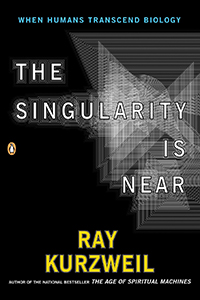
Mm-hmm. Autism, as well.
Autism, for sure. Yeah, absolutely!
Becoming quite an epidemic.
Indeed.
All right! Well, thank you so much! It’s www.readsuperyou.com. If somebody wanted to work with you, get some coaching, or consulting, are you guys available for that?
Yeah! You can get connected to us through the website. All our contact information is there. Speaking for a number to call is there. I’m an**@*********er.com and Kay is ka*@*********er.com. We’re on, so just drop us a note.
All right, perfect! Well, thank you, guys! Thank you, listeners! This is Stephan Spencer, signing off, and we’ll see you on the next episode!

